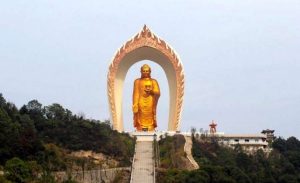
Beginner’s Mind is a special project from BDG collecting insightful essays written by US college students who have attended experiential-learning-based courses related to Buddhism. Some of the authors identify as Buddhists, for others it is their first encounter with the Buddhadharma. All are sharing reflections and impressions on what they’ve learned, how it has impacted their lives, and how they might continue to engage with the teaching.
Jinwoo Kang wrote this essay for his Buddhist Literature course at Williams College in Massachusetts. He will graduate in 2024 and is tentatively considering a major in Art History and Environmental Science. Jinwoo enjoys running and spending time with his dogs at home in San Diego.
My experience with this course on Buddhist Literature was one of perspective. Like many, I came into the class with a peripheral and shallow knowledge of Buddhism, mostly stemming from stereotypes and the occasional cultural link. In my “application” for the class, I wrote that “to me, Buddhism, much like my Korean identity itself, has always felt like a puzzle.” But after my experience with the class this past semester, this comparison feels immensely inadequate. Buddhism is not a puzzle, to be pieced together and understood as one whole. It is at once a religion, a history, a culture, and a way of life. In our reflections and discussions for the class, it seemed that we often found ourselves returning to the same question: what is Buddhism? I’m not sure if a clear answer exists.
This class has been a constant exercise in perspective. A study of Buddhism, in its myriad forms and branches, forces one to think in terms of both fine details and broad strokes. Ideas and values, already foreign to our narrow viewpoints, are complicated by contradictions and nuance. Stories, often simple on their surface, become clouded when viewed through a modern context and lens. All of this can feel frustrating at first, and it takes time and work to understand. Over the course of the semester, I’ve gotten better at grasping this and, by extension, better at understanding how we as a whole view Buddhism. Generalizations, while convenient and useful at times, can only go so far. To even begin to do justice to the vast complexities of Buddhism, one must take a deeper look within.
I think it was this “looking within” that made the two experiential-learning assignments on this course so powerful. In both assignments, we were pushed beyond easy generalizations and challenged to integrate the ideas at play into our own lives. In the first experiential learning, in accordance with the holiday Māgha Pūjā, we were tasked with following the eight Buddhist precepts. This assignment, in its purposeful deprivations and guidelines, forced me to reconsider the ways in which I choose to spend my time. Were the actions of my daily life karmically fruitful? Or were they apuñña and harmful to others and myself? These large questions of Buddhist thought linger and resurface in my mind, no doubt a result of my experience following aṭṭhaṅga-sīla (Pali: the eight precepts).
In the second experiential learning, we were tasked with a week-long social media cleanse and meditation exercise. And again, I experienced how stepping out of my comfort zone leads to new realizations. The assignment, with its focus on concentration and mindfulness, was an abrupt introduction to the wandering, easily distracted creature that is my mind. The breaking of old habits and creation of new ones was a strange, yet powerful learning experience regarding the Buddhist ideas of sati and meditation.
Taken together, the experiential-learning assignments offered me a unique opportunity to lean into the subject material of Buddhist Literature. I think that at school, it’s so easy to fall into the comfortable habits of reading without engaging or discussing without thinking. Being forced to step into the ideas on the page reinvented my perceptions on certain topics, and certainly brought me closer to a deeper understanding of Buddhism. But I’ve since re-downloaded Instagram. I listen to music while I eat dinner, and I swat at flies. Does this mean that I’m no further along from where I started? I know that I’ve learned a lot, but where has it brought me? In other words, if I’m not directly applying the things that I’ve learned, what am I left with?
In my case, I take solace in the fact that Buddhist Literature has changed the way I form perceptions and ideas regarding the unfamiliar. Time and time again, our readings and presentations have proved that Buddhism cannot be put in a box, and that Western perceptions of the religion and culture are often simplified or pacified. This is an important awareness to keep in mind, for Buddhism and beyond. And it is something that I hope to carry forward with me throughout life.
So what’s next? I think that my time studying Buddhism was valuable, particularly as I move through this stage of life. More and more, we find ourselves disconnecting, disregarding, and disrespecting each other. Doubly so in the context of this pandemic. The rise of technology and social media has made it easy for us to distance ourselves and tune out, and our days are governed by old and harmful habits. If I’m trying to re-engage and focus in, I need all the help I can get. And throughout this semester, Buddhist Literature has been that help. It’s been a guide, a teacher, and a coach. It’s been a toolbox for life.
Related features from BDG
Beginner’s Mind: Buddhist Modernism: A Transformative and Empowering Think Tank for Social Change
Beginner’s Mind: A Renewed Sense of Life – Revelations through Buddhist Material Culture
Beginner’s Mind: A Whole New World











